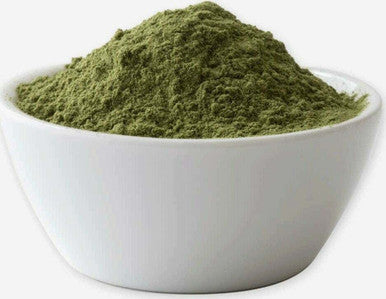Organic wheatgrass powder 50G
Organic wheatgrass powder 50G
Couldn't load pickup availability
Organic wheatgrass powder 50g
Wheatgrass, the young grass of the wheat plant (Triticum aestivum), is celebrated for its potential health benefits. It is often consumed as a juice, powder, or in fresh form. Here are some of the potential benefits associated with wheatgrass:
-
Nutrient-Dense: Wheatgrass is packed with various nutrients, including vitamins, minerals, enzymes, amino acids, and chlorophyll. It contains vitamins A, C, E, and K, as well as B vitamins like B1 (thiamine), B2 (riboflavin), B3 (niacin), B6 (pyridoxine), and B9 (folate). Minerals such as iron, calcium, magnesium, and potassium are also present in wheatgrass.
-
Antioxidant Properties: Wheatgrass is rich in antioxidants, such as flavonoids and phenolic compounds, which help protect cells from oxidative damage caused by free radicals. Antioxidants play a role in reducing inflammation, supporting immune function, and lowering the risk of chronic diseases.
-
Detoxification: Wheatgrass is believed to have detoxifying properties that help cleanse the body of toxins and impurities. Chlorophyll, the green pigment found in wheatgrass, is thought to bind to toxins and heavy metals, facilitating their elimination from the body.
-
Immune Support: The vitamins, minerals, and antioxidants present in wheatgrass may help support immune function and enhance the body's ability to fight off infections and illnesses. Regular consumption of wheatgrass may help strengthen the immune system and improve overall health.
-
Digestive Health: Wheatgrass is often touted for its potential benefits for digestive health. It contains dietary fiber, which supports regular bowel movements and may help alleviate constipation. Additionally, wheatgrass may help promote the growth of beneficial gut bacteria, supporting a healthy microbiome.
-
Alkalizing Effect: Wheatgrass is considered to have an alkalizing effect on the body, which means it may help balance pH levels and reduce acidity. Some proponents believe that maintaining an alkaline environment in the body can help prevent certain health problems and promote overall well-being.
-
Energy Boost: Some people report feeling an increase in energy and vitality after consuming wheatgrass regularly. This may be attributed to its nutrient content, particularly its high levels of vitamins, minerals, and enzymes, which support cellular energy production.
-
Skin Health: Wheatgrass is sometimes used topically or consumed internally for its potential benefits for skin health. It is believed to help reduce inflammation, promote wound healing, and improve the appearance of skin conditions like acne, eczema, and psoriasis.
It's important to note that while wheatgrass offers many potential health benefits, scientific research on its efficacy is still limited, and more studies are needed to confirm its effects. Additionally, some people may experience digestive discomfort or allergic reactions when consuming wheatgrass, especially in large quantities. As with any dietary supplement, it's advisable to consult with a healthcare professional before adding wheatgrass to your routine, especially if you have underlying health conditions or are taking medications.
Share


